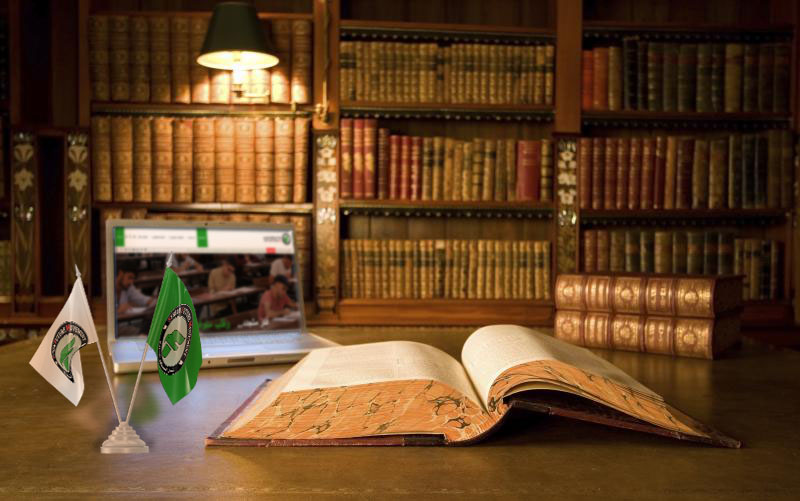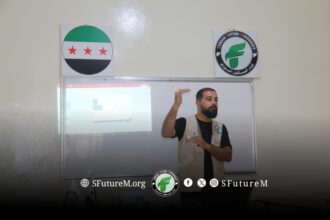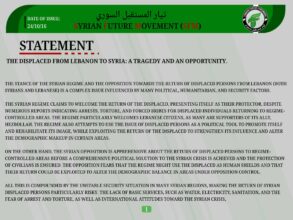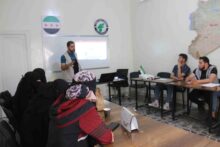An objective analysis of the scenario of tyranny in Syria after Assad

Introduction:
In light of the fall of Bashar al-Assad’s regime and the assumption of Ahmad al-Shara’s leadership of the transitional phase, which includes many opportunities, expectations, and desires, objective research calls us to consider all possible scenarios. The more realistic the scenario, the more valuable its study for the future, as it prepares us for what might come.
Far from the paradox of choice, which “Barry Schwartz” explained as the phase of abundant options not necessarily increasing our ability to make the right decision but rather increasing our anxiety, what Syria is going through today with an abundance of options might present an opportunity that our generation might never experience again. This means that anxiety is a small issue compared to shaping our lives and our country by simply choosing one of the options presented today.
Syria faces multiple options, and the most ideal among them may not be becoming an advanced democratic state (the Norway of the East) or an emerging state like Singapore. But have we considered the most pessimistic scenario?
Perhaps we cannot repeat the experience of the Assad regime, and the positive thing is that there is no longer oppression for the majority, dominance for the minority, or criminal rule. But are we ready for the worst of scenarios?
Preliminary Signs:
Let us try to anticipate a scenario where Ahmad al-Shara moves toward autocracy in governance! Despite the public statements affirming pluralism and democracy, several factors favor this scenario:
- Control over the Armed Forces: Particularly after the recent appointments and promotions that were limited to his group, if al-Shara manages to take full control of the military and security forces, he might use this power to suppress any form of opposition and ensure his stay in power. (A clear example of this is the governance of Idlib and its administration under al-Julani.) Thus, his control over the military becomes a preemptive step to crush any future opponents, and there are plenty of justifications these days.
- Election Delay: Although the period he proposed in his interview on Al-Arabiya is very long (4 years), he could use security and stability concerns as excuses to delay elections further, giving him time to consolidate his power.
- Government Appointments: If he continues appointing loyalists to key government positions, under the pretext of forming a cohesive team (as he mentioned), this could lead to the establishment of a centralized, loyal system of governance, thus disrupting balance and shielding him from accountability.
- Suppression of Opposition: Despite al-Shara’s affirmation of the right to demonstrate, any actual opposition could be suppressed under the pretext of maintaining security and stability. This could include arbitrary arrests or the use of force against protesters, especially since the rhetoric of “remnants” and “shabiha” could provide the grounds for this.
- Media Control: This could involve imposing censorship on news and information being published, as indicated by the delays in the launch of official media.
- International Alliances: These seem focused on making al-Shara a legitimate president or a controlling leader, despite the fact that the “Deterrence Forces” were not the ones who entered Damascus! Therefore, al-Shara might seek to build alliances with countries that support him in exchange for political or economic concessions, which would strengthen his internal position.
Although these preliminary signs carry a certain level of effectiveness in reinforcing the autocratic scenario, there are objective motives that may make this scenario the most likely in the future.
Motivations for the Autocratic Scenario:
Ahmad al-Shara, also known as Abu Muhammad al-Jolani, comes from a jihadist Salafi background. He led Hayat Tahrir al-Sham for a long period before taking charge of the transitional phase in Syria. Perhaps the most significant motivation toward the autocratic scenario is the ideological drive, which itself can be divided into five factors:
- Focus on Stability and Security: Al-Shara may see stability and security as the top priority in the post-conflict phase, which could lead him to adopt autocratic measures to prevent the return of chaos. This may include suppressing opposition and restricting freedoms to ensure full control.
- Ideological Influences: Despite the transformations that Hayat Tahrir al-Sham underwent under his leadership, his jihadist Salafi background may influence his political inclinations. Al-Shara might view a strong centralized government as the only way to preserve the Islamic system he believes in.
- Past Experiences: His experience in Idlib and his previous leadership of armed groups, where central control and firm authority were essential for survival in a conflict-ridden environment, likely shape his vision for governance and push him toward autocracy.
- International Alliances: His alliances with countries that support him in exchange for political or economic concessions, particularly Turkey, Israel, and the United States, could strengthen his internal position. These alliances may necessitate autocratic actions to secure international support.
- Internal Challenges: Al-Shara undoubtedly faces significant challenges in rebuilding Syria and bridging societal divides. Therefore, strong central governance might be seen as the only option to achieve these goals amidst deep divisions between Syria’s components.
Internal Motivations:
In the wake of the fall of Bashar al-Assad’s regime and the assumption of leadership by Ahmad al-Shara in the transitional phase, it is possible to analyze the internal political motivations and the level of crisis within the military and political forces that may push toward an autocratic scenario due to six factors:
- Competition for Power: Various political and military forces in Syria are seeking to enhance their influence and secure their interests, which means that this competition could lead to internal conflicts, pushing al-Shara to adopt autocratic policies to ensure control and stability.
- Deep Internal Divisions: Syria is experiencing deep internal divisions among various factions and sects, which may make it difficult to achieve political consensus, leading al-Shara to use force to ensure unity and control.
- Ongoing Security Threats from Armed Groups and Terrorist Organizations: The continued threats from armed groups and terrorist organizations may drive al-Shara to adopt repressive policies to ensure security and stability, including the imposition of a state of emergency and restricting freedoms.
- Economic Pressures: The Syrian economy is facing severe crises due to the long war, which may compel al-Shara to adopt autocratic policies to control and distribute economic resources in a way that ensures the stability of the regime.
- External Influences Within Syria: Regional and international powers have conflicting interests in Syria, and these powers might support autocratic policies if they serve their interests, thereby strengthening al-Shara’s position in adopting these policies.
- Weak Democratic Institutions: The absence of strong and effective democratic institutions may lead al-Shara to feel compelled to adopt autocratic policies to ensure control over governance and prevent chaos.
Given these six factors, it can be said that there are internal political motivations and a significant level of crisis within the military and political forces that may push Ahmad al-Shara toward an autocratic scenario.
Geopolitical Motivations:
The geopolitical motivations and Syria’s role within the international system play a significant role in the selection of the autocratic scenario. There are five geopolitical factors that may influence this scenario:
- Strategic Geographical Location: Syria is located in a vital region that connects Asia, Europe, and Africa, making it a focal point for regional and international powers. Controlling Syria would mean controlling vital trade and transport routes, which may prompt international powers to support an autocratic system that ensures stability and control.
- Natural Resources: Syria possesses important natural resources such as oil and gas, which are of great interest to international powers. Therefore, an autocratic regime may be more capable of securing these resources and ensuring their smooth flow into global markets without political complications.
- Regional Balances: Regional powers such as the defeated Iran, Turkey, and Saudi Arabia have divergent interests in Syria. Supporting an autocratic system could be a means to achieve these interests without engaging in prolonged conflicts.
- International Conflicts: Major powers like the United States and Russia use Syria as a battleground to settle scores and achieve their geopolitical interests. Therefore, supporting an autocratic system may be seen as a way to ensure regional stability and prevent the escalation of conflicts that may affect international interests.
- Counterterrorism: An autocratic system might be more effective in combating terrorist organizations and ensuring internal security. Al-Shara’s experience in controlling Idlib and contributing to the fight against such groups (e.g., ISIS, Jabhat al-Nusra, Hurras al-Din) makes him a favorable option for some international powers seeking stability in the region.
Considering these five factors, it can be said that geopolitical motivations and Syria’s role within the international system play a significant role in the selection of the autocratic scenario.
The Philosophy of “Just Despotism”:
The philosophy of “just despotism” is a controversial idea that addresses the concept of absolute rule exercised by a strong and firm ruler who, however, is just in their decisions and policies. This idea has appeared in different contexts throughout history and has been discussed by many thinkers and theorists in both the Western world and the Islamic world.
In Western thought, the roots of the idea of “just despotism” can be traced back to Greek philosophers such as Plato and Aristotle. In his book “The Republic,” Plato spoke of the “philosopher-king,” who should be an absolute ruler, but one who is just and wise. Aristotle also addressed the idea of absolute rule in his book “Politics,” where he suggested that absolute rule could be beneficial if the ruler was just and wise.
Hobbes, in his book “Leviathan,” established the state as a “dragon” that monopolizes violence.
In Islamic thought, this idea has been addressed in a different way. Some Islamic thinkers, such as Jamal al-Din al-Afghani and Muhammad Abduh, discussed the concept of “the just despot” in the context of political and social reform. However, there is debate about how much they supported this idea. Upon investigation, we find that al-Afghani and Abduh called for reform and consultation (shura), not despotism in its negative sense, but the concept of the just despot remains rooted in Salafi thought, which emphasizes obedience to the ruler.
It is worth noting that Abdul Rahman al-Kawakibi, in his book “The Nature of Despotism,” was one of the strongest critics of the idea of despotism, arguing that despotism inherently leads to corruption and injustice, even if the ruler believes themselves to be just.
The idea of “just despotism” remains controversial, with opinions ranging from support for it as a means to achieve stability and decisiveness to opposition due to the risks of corruption and injustice. Ultimately, the evaluation of this idea depends on the historical and cultural context in which it is discussed.
If we assume that Ahmed al-Shar’a is leaning towards just despotism, there could be some potential positives to this approach, especially if it differs from Bashar al-Assad’s regime in its use of violence against the people. Some of these positives include:
- Stability and Security: Just despotism can provide a level of stability and security in the country, helping to rebuild infrastructure and improve living conditions for the population. This could be particularly important in the post-conflict phase.
- Social Justice: If al-Shar’a adheres to principles of justice in his rule, he may be able to achieve a more equitable distribution of resources and wealth, reducing poverty and social inequality.
- Economic Reforms: A just despotism might be more capable of implementing radical economic reforms without facing significant resistance from various political forces that may be aligned with external or even internal agendas. This could include improving the business environment and attracting foreign investments.
- Combating Corruption: Just despotism could be effective in combating corruption if al-Shar’a is committed to transparency and integrity. This could also enhance citizens’ trust in the government and encourage civic participation.
- Sustainable Development: A just despotism might be able to implement long-term developmental policies without being influenced by short-term political pressures, voter preferences, or the drawbacks of democracy, such as populism and harmful short-term solutions. This could include improvements in education, healthcare, and infrastructure.
- Balance of Powers: If al-Shar’a succeeds in achieving a balance of power among the various forces in society, he could avoid internal conflicts and ensure the stability of the regime.
It is worth noting that these positives largely depend on al-Shar’a’s commitment to principles of justice and integrity, as well as his ability to strike a balance between despotism and just rule. It is also important to have oversight and accountability to ensure the system does not deviate towards repressive despotism.
The reason for favoring the option of “just despotism” as a realistic choice might also be due to the weakness of the current democratic path in Syria. Building a democratic state in Syria faces numerous challenges that could hinder the achievement of a fair and stable government system, including:
- Corruption and Inefficiency: In many democratic countries, political leaders and government officials may be corrupt or incompetent, leading to a loss of citizens’ trust in the democratic system. How can this be the case in a country that has not experienced democratic rule like Syria?
- Anti-Society Elements: During elections, anti-society elements may try to influence results through bribery or threats, as was the case during Assad’s rule, weakening the integrity of the democratic process.
- Large Socioeconomic Gaps: A significant gap between social and economic classes may lead to unequal political participation opportunities, where the rich and influential have a greater chance of winning elections compared to others.
- Sectarianism, Racism, or Ethnic Discrimination: This may impact elections, especially in a country that has undergone national fragmentation during the Assad family’s rule, where candidates are chosen based on affiliations rather than qualifications, leading to the marginalization of some groups.
- Security Threats from Armed Groups or Terrorist Organizations: These could disrupt the democratic process and lead to the imposition of exceptional measures that restrict civil liberties.
- Building Strong and Effective Democratic Institutions: This requires time and significant efforts. Sometimes, these institutions may be weak or incapable of performing their roles effectively, leading to a decline in trust in the democratic system.
- Cultural Resistance: There may be a cultural resistance to the idea of democracy due to traditions or social values that favor centralized or authoritarian rule.
- Regional and International Powers: These powers may intervene in the internal affairs of weak democratic countries like Syria to achieve their own interests, destabilizing political stability.
While these challenges require continuous efforts from governments and societies to overcome and ensure the establishment of a just and stable democratic state, they may also make the option of despotism more likely.
Conclusion:
There is no doubt that there is a plan, whether internal or external, being worked on in Syria to shape the features of the new political system. There is also no doubt that Syrians dream of a strong, national, and advanced state, especially since they have traveled to various countries and gained new experiences that make them dream of applying the best practices to their newly born country. This article, however, does not focus on all of that, but rather seeks to shed light on the possibility that the decree might be the worst of the expected scenarios, which certainly is not expected to replicate the Assad family’s experience.
This article briefly attempts to analyze whether Ahmad al-Shara may adopt the scenario of despotism, providing a final objective reading of what the correct stance might be, which may require a balance between maintaining stability and addressing any violations of human rights and basic freedoms. To this end, a vision for achieving this balance can be presented as follows:
- The international community and local organizations must monitor the government’s actions and ensure the presence of accountability mechanisms, including regular reports on the state of human rights and transparency in governance.
- Strengthening and supporting civil society organizations working to promote human rights and democracy. These organizations can play a crucial role in educating citizens, defending their rights, and eventually advocating for the establishment of a democratic option.
- Encouraging dialogue between the government and the opposition to ensure channels for communication and negotiation, with the aim of avoiding escalation and violence and preventing a repeat of the 2011 experience.
- Using international pressure through sanctions or diplomacy to ensure the government adheres to human rights and democracy principles. This may include cooperation with the United Nations and other international organizations.
- Promoting awareness and education on human rights and democracy among citizens, as this can help build a political culture that supports good governance and accountability.
- Political and social forces must be ready for change and adaptation to new circumstances. This may involve building new alliances and working toward the necessary reforms.
In the end, the correct stance requires a delicate balance between maintaining stability on one hand and addressing any violations of human rights on the other. It is crucial to have continuous efforts to ensure the government’s commitment to justice and democracy principles.
Achieving accountability in a despotic regime presents a significant challenge, but there are several mechanisms that can be used to ensure a level of transparency and accountability, such as supporting independent media to monitor the government and disseminate information about violations and corruption, as well as having an independent judiciary to ensure accountability for government officials. Additionally, organizing peaceful protests and popular movements can exert pressure on the government to achieve accountability. It is also essential to utilize technology, such as social media, to spread information, organize campaigns, and contribute to documenting violations and disseminating them widely.
These mechanisms can help achieve a degree of accountability even under a despotic regime. It is important to have continuous and coordinated efforts to ensure the government’s commitment to the principles of transparency and justice. As for choosing one scenario over another, this is not the concern of this article, which aimed to deconstruct the worst-case scenario, hoping that the future of Syrians will be nothing but the best of scenarios.
Political Office
Jomaa Mohammad Laheep
Director of the Research and Studies Department
Articles
Syrian Future Movement






